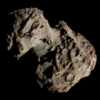32P/Comas Solà
 | |
| Discovery | |
|---|---|
| Discovered by | Josep Comas i Solà |
| Discovery date | November 5, 1926 |
| Designations | |
| 1944 II; 1952 VII; 1951h; 1961 III; 1960f; 1969 VIII; 1968g; 1978 XVII; 1977n; 1987 XVIII; 1986j; 32P/1926 V1; 1927 III; 1926f; 32P/1935 P1; 1935 IV; 1935c; 32P/1960 VL; 1961 III; 1960f | |
| Orbital characteristics | |
| Epoch | March 6, 2006 |
| Aphelion | 6.692 AU |
| Perihelion | 1.834 AU |
| Semi-major axis | 4.263 AU |
| Eccentricity | 0.5699 |
| Orbital period | 8.801 a |
| Inclination | 12.9312° |
| Last perihelion | October 17, 2014[1] April 1, 2005 |
| Next perihelion | April 20, 2024[2] |
32P/Comas Solà is a periodic comet with a current orbital period of 8.8 years.
The comet nucleus is estimated to be 8.4 kilometers in diameter.[3]
History
32P/Comas Solà was discovered November 5, 1926, by Josep Comas Solà. As part of his work on asteroids for the Fabra Observatory (Barcelona), he was taking photographs with a 6-inch (150 mm) telescope. The comet's past orbital evolution became a point of interest as several astronomers suggested early on that the comet might be a return of the then lost periodic comet Spitaler (113P/Spitaler). In 1935 additional positions had been obtained, and P. Ramensky investigated the orbital motion back to 1911. He noted the comet passed very close to Jupiter during May 1912 and that, prior to this approach, the comet had a perihelion distance of 2.15 AU and an orbital period of 9.43 years. The identity with comet Spitaler was thus disproven.
In 1933, the Danish astronomer Julie Vinter Hansen undertook significant new research which calculated the orbit of the comet up to 1980, predicting when it would return to the Earth's orbit.[4]
In 1969, Soviet astronomers Klim Churyumov and Svetlana Gerasimenko searched for 32P/Comas Solà on photographic plates, and serendipously discovered a new comet, 67P/Churyumov-Gerasimenko.[5]
Trivia
This article contains a list of miscellaneous information. (October 2024) |
The title of the early Tangerine Dream piece "Fly and Collision of Coma[s] Sola", appearing on the Alpha Centauri (1971) album, refers to this comet, which at the time was undergoing a moderately close (0.73 AU) approach to Jupiter.[citation needed]
References
- ^ Syuichi Nakano (2011-11-04). "32P/Comas Sola (NK 2155)". OAA Computing and Minor Planet Sections. Retrieved 2012-02-18.
- ^ "32P/Comas Sola Orbit". Minor Planet Center. Retrieved 2014-10-29.
- ^ "JPL Small-Body Database Browser: 32P/Comas Sola" (last observation:2014-01-25). Jet Propulsion Laboratory. Retrieved 2010-02-26.
- ^ Hansen, Julie M. Vinter (1933). "The periodic comet Comas Sola (1926 f) at its return in the year 1935". Publikationer og Mindre Meddeler Fra Kobenhavns Observatorium. 85: 1–16. Bibcode:1933PCopO..85....1H.
- ^ Kronk, Gary W. & Meyer, Maik (2010). "67P/1969 R1 (Churyumov-Gerasimenko)". Cometography: A Catalog of Comets; Volume 5: 1960–1982. Cambridge University Press. pp. 241–245. ISBN 978-0-521-87226-3.
External links
- Orbital simulation from JPL (Java) / Horizons Ephemeris
- Elements and Ephemeris for 32P/Comas Sola – Minor Planet Center
- 32P/Comas Sola – Seiichi Yoshida @ aerith.net
- 32P/Comas Solà – Gary W. Kronk's Cometography


